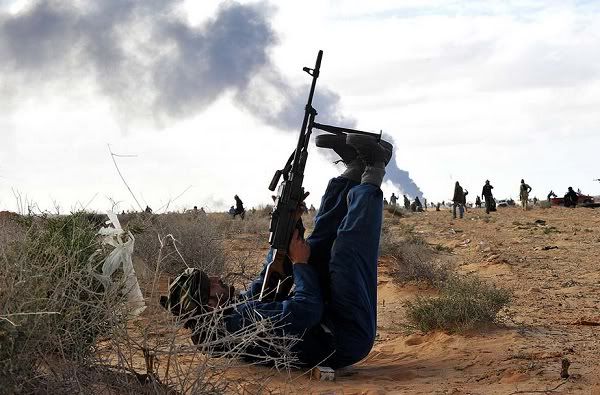Photo from the LA Times
 We’ve seen calls for a no-fly zone from several fronts ~ both at home and abroad. It seems to be the favored form of intervention of British PM Cameron, US Senators McCain, Lieberman, and Kerry as well as any number of twitterers. We have seen calls for a no-fly zone in Libya, too, to be sure. On the flip side, Gaddafi has vowed to use whatever military he has to fight a no-fly zone.
We’ve seen calls for a no-fly zone from several fronts ~ both at home and abroad. It seems to be the favored form of intervention of British PM Cameron, US Senators McCain, Lieberman, and Kerry as well as any number of twitterers. We have seen calls for a no-fly zone in Libya, too, to be sure. On the flip side, Gaddafi has vowed to use whatever military he has to fight a no-fly zone.
Me? I don’t mind the idea (those three years I spent as a Data Processing Technician in the Navy made me a military expert) as long as the US does not take the lead. I firmly believe, as SoS Clinton has said recently, the UN and/or NATO and/or the Arab League should take the lead.
What I find intriguing are the thoughts of SecDef Gates who, as you know, is a holdover from the Bush Administration and former CIA deputy director for intelligence during the Reagan years.
In his 1996 memoir From the Shadows, Robert Gates recalls that the Reagan administration “wanted [Muammar Gaddafi’s] hide in the worst way.” The Defense Department even drew up a contingency plan for a U.S.-Egyptian attack on Libya, Gates remembers in the book.
snip
He worried about the consequences; namely that such action could spark a global outcry against American imperialism, and an upsurge in terrorism against U.S. citizens and installations. The Daily Beast
Twenty-five years later, Gates, now Barack Obama’s defense secretary, is confronting a similar zeal for action against Gaddafi, amid international revulsion against the strongman’s brutal attempts to crush an uprising by Libyans fed up with his 40-year rule. Gates remains worried about the likely fallout from Western intervention in Libya-in particular, the probability of a storm of protests throughout the Arab world, bringing with it terrorist attacks against Americans.
That’s what many of us have been saying for days if not weeks. There may be tremendous satisfaction in bringing Gaddafi down using the military but there are long-term possible repercussions to be considered.
Gates is wary of calls for a no-fly zone over Libya, a suggestion being pushed by British Prime Minister David Cameron. Pentagon planners say establishing a no-fly zone probably would accomplish little. And with Washington already having effectively declared war, the inevitable next step would be calls for expanded air operations to attack Gaddafi’s land forces, as Gates foresees it. Step by step, the U.S. would find itself committed to the military overthrow of Gaddafi’s regime. Gates wants everyone to realize that such a commitment would almost certainly require sending in U.S. ground forces.
We may have the best of intentions from the outset by limiting our interaction to a no-fly zone and supporting other countries. But how often do we find ourselves supplying the bulk of the assets?
From the Shadows describes in detail the outcomes of “limited” U.S. engagements in crises around the world. Some turned out better than others: America’s covert arming of UNITA rebels in Angola, for example. But most-the doomed 1982-83 peacekeeping mission in Lebanon, the funding, arming, and training of Islamist guerrillas in Afghanistan in the 1980s, the entire misbegotten Iran-Contra scheme-had consequences that were utterly unanticipated when the interventions were planned.
Insanity has famously been defined as doing the same thing over and over again and expecting different results. So let’s do this in an area of the world in which we’ve already been grossly insane over and over again.
A quarter-century on, Gates says U.S. military action in Libya could spur more anti-American terrorist acts, and he is convinced America should not act alone. Those convictions explain why Gates has been so dismissive of proposals for a no-fly zone over Libya. “There is a lot of loose talk, frankly, about some of these military options,” he told the Senate on March 2. “A no-fly zone begins with an attack on Libya to destroy the air defenses… That is the way it starts.” Gates could allow himself to be so blunt because the idea had been publicly advocated by a foreign leader, British Prime Minister David Cameron. Britain has nothing close to a capability to mount a no-fly zone on its own.
That’s an interesting point about Cameron’s desire for a no-fly zone. If Britain lacks the resources whom does Cameron expect to make up that lack? Hmmm, the US perhaps? We’ve been gung-ho in the past so why not?
NATO apparently isn’t really interested in a no-fly zone and the UN faces potential vetos from Russia and/or China. The Arab League so far seems to support a no-fly zone and is meeting Saturday. Meanwhile, SecDef Gates will be meeting with NATO defense ministers on March 10.. These meetings combined with Gaddafi’s latest diplomatic maneuvers, whatever they are, could prove decisive. Or not.
Whatever happens in the coming days Gate has helped cement his place as one of my favorite cabinet members.
145 comments